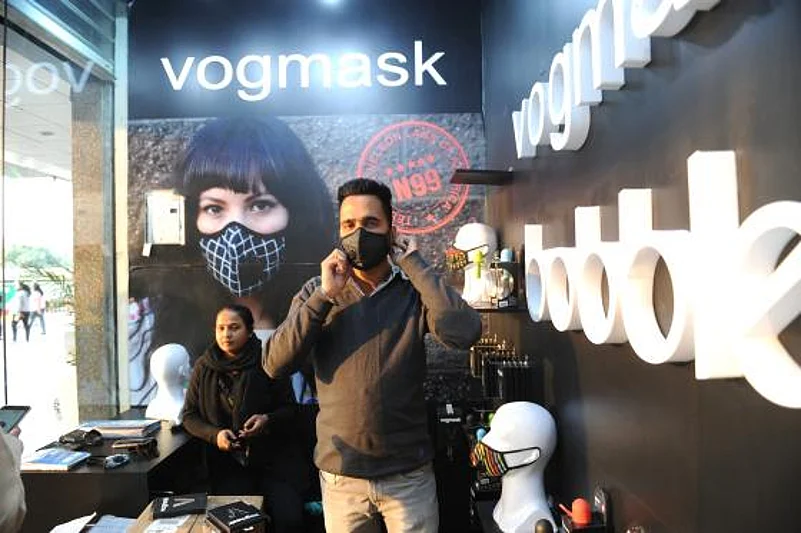The French are, of course, renowned for their designer chic that’s calculated to take your breath away. And, yet, among those who had gathered at a fashion show at the French Embassy in Delhi, the sharpest intake of breaths was reserved for an odd little ‘fashion accessory’ that models sported on the runway. These were respiratory masks, designed by Manish Arora for the California-based multinational Vogmask, and their appearance on the fashion ramps—in Delhi and at other world cities—marks an acknowledgement of two realities. One, that pollution levels in Delhi and other world cities are so high that the concern over them is being mainstreamed even in air-kissing social circles. And second, that in order to insulate yourself from air-borne particulate matter, you no longer have to go around looking like the villainous Bane from the Batman movie, or like a side-actor from Grey’s Anatomy. Respiratory masks can even be, well, cool.
Advertisement
And from all accounts, pollution-wary folks across Indian cities are embracing this fashion trend even while donning the prophylactic masks for health reasons. “We can’t manufacture them fast enough, and are selling 1,000 pieces a day,” gloats Jai Dhar Gupta, CEO of Nirvanabeing, the only distributer of Vogmask in South Asia.

Unlike plain-vanilla disposable surgical marks, which typically cost from Rs 15 to Rs 250 each and cannot efficiently filter inhaled air, the pricier (from Rs 1,800 to Rs 8,000) premium designer masks have nitrogen filters, respiratory valves and other accouterments and do a far better job of keeping you breathing easy, and clean. More specifically, surgical masks have a filter efficiency of N95, whereas the designer pollution masks are N99, which means they can filter out even fine particulate matter as small as 0.25mm (about 99.97 percent of particulate matter is filtered). The designer masks are also more durable—for up to eight months, with the filters required to be cleaned every four to six weeks.
Advertisement
Manish Singh, merchandising head at Fortis Healthworld, says there has been a dramatic increase in the demand for the masks: “As compared to surgical masks, these designer masks have a respiratory valve, which enhances the inhale-exhale function.” Wearability too is the key, and these designer masks increasingly double as fashion accessories of the quirky (but eye-catching) kind.
For folks like Neha Pandey, it is the fusion of the fashionable with the utilitarian function that renders these new-gen masks appealing. “Their cool quotient certainly counts, even if they are a little expensive,” she says. “I wear it to places that I know will be dusty, and I’m seeing a huge difference in the quality of the air I breathe.” After Diwali, she noticed that the filters of her recycleable, washable facemask were black with pollutants that she would otherwise have breathed in.
Gupta too bears personal testimony to the efficacy of these masks. His lung function had been down 50 percent from breathing in pollutants, but it was revived to near-normalcy after just three weeks of wearing the mask, he says.
With the increasing popularity of these pollution masks in the Indian markets, the number of players in the business is also going up. While Vogmask is the only known face in the designer masks business with a direct distribution network in India, another brand, Respro UK, has made significant headway through its online sales; and there are more than a handful of Chinese manufacturers catering to the Indian market. “Facemasks are meant for public living, keeping in mind personal and public health in tangent with the environment, therefore the idea is to fuse quality, function and design,” says Harry Cole, founder of Respro UK. The tagline for the company advertisements—“Fashion with Func”—sums up the prevailing trend rather well. “Whoever thought pollution would be in vogue,” wonders another of their ad lines.
Advertisement
Fashion enthusiast Rasna Bhasin, who is enamoured by the fusion of fashion sense with a very utilitarian product, sees these designerwear as being cost-effective in terms of durability. “I use it everyday,” she says. “I don’t think people wear it as a fashion statement. It is about wearing a utility fashionably.”

Ace fashion designer David Abraham, however, doesn’t see this trend as a “serious business endeavour,” but rather as a fashion statement on an issue that appears to plague society at this moment. “Every product is, of course, open to design, and so facemasks too are,” he acknowledges. “I think the masks are likely to stay as long as there is pollution.”
Advertisement
In a sense, these designer masks are a socio-political commentary on our times. As Francis Chum, CEO of Totobobo, the Singapore-based high-tech pollution masks, says: “The masks are a compelling necessity, so inevitably they have become a fashion item too. Some of my clients refer to it as a ‘functional fashion accessory’.”



















